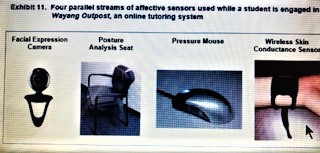
(China is monitoring the brain activity of employees in its state-run firms. The technology works by placing wireless sensors in workers’ hats that when combined with AI can spot workplace anxiety or depression. Pictured is a version installed in the cap visors of train drivers Pic courtesy. )
While many would agree this report from China is disturbing …( One snippet from the longer articles states: “Workers outfitted in uniforms staff lines producing sophisticated equipment for telecommunication and other industrial sectors. But there’s one big difference – the workers wear caps to monitor their brainwaves, data that management then uses to adjust the pace of production and redesign workflows, according to the company. The company said it could increase the overall efficiency of the workers by manipulating the frequency and length of break times to reduce mental stress.”) …
… if you share this report with most people, they will reply, “Well, that’s China. This is a democracy. It will never happen here.”
What if it already is? What if I were to hide all the identifying information from any of the reports posted below, would you really be able to tell which one was talking about China and which one was talking about public education in America?
At some juncture we have to accept things are they are really happening and not as we wish them to be. The primary source reports (two examples shared below) from organizations and institutions right here in the good ol’ USA speak for themselves. Then compare this with the report from China.
- From the Promoting Grit, Tenacity and Perseverance: Critical factors for Success report published by the U.S> Office of Educational Technology in 2013 (the link to the website is no longer available. Fortunately I saved it on my hard drive. You can read the report here.) The report says, “Examples of affective computing methods are growing. Mcquiggan, Lee, and Lester (2007) have used data mining techniques as well as physiological response data from a biofeedback apparatus that measures blood volume, pulse, and galvanic skin response to examine student frustration in an online learning environment, Crystal Island. Woolf, Burleson, Arroyo, Dragon, Cooper and Picard (2009) have been detecting affective indicators within an online tutoring system Wayang Outpost using four sensor systems, as illustrated in Exhibit 11. Sensors provide constant, parallel streams of data and are used with data mining techniques and self-report measures to examine frustration, motivation/flow, confidence, boredom, and fatigue. The MIT Media Lab Mood Meter (Hernandez, Hoque, & Picard, n.d.) is a device that can be used to detect emotion (smiles) among groups. The Mood Meter includes a camera and a laptop. The camera captures facial expressions, and software on the laptop extracts geometric properties on faces (like distance between corner lips and eyes) to provide a smile intensity score. While this type of tool may not be necessary in a small class of students, it could be useful for examining emotional responses in informal learning environments for large groups, like museums. The field of neuroscience also offers methods for insight into some of the psychological resources associated with grit, especially effortful control. Using neuroimaging techniques, such as fMRI, it is possible to examine which parts of the brain are active during times of anxiety or stress and the effects of some interventions. For example, Slagter, Davidson, and Lutz (2011) have investigated the effects of systematic mental training and meditation to enhance cognitive control and maintain optimal levels of arousal. Motivation was found to be associated with greater activation in multiple brain regions. Moreover, studies have reported functional and structural changes in the brain and improved performance of long-term practitioners of mindfulness and concentration meditation techniques that enhance attentional focus. These initial findings are promising evidence of the cognitive plasticity and malleability of brain functioning for processes related to grit. While it is impractical to use fMRI in the classroom (i.e., it is a prohibitively expensive, room-sized machine), Ed Dieterle and Ash Vasudeva of the Bill & Melinda Gates Foundation point out that researchers such as Jon Gabrieli and Richard Davidson are beginning to use multiple methods to explore how specific brain activity is correlated with other cognitive and affective indicators that are practical to measure in school settings.”
Exhibit 11. Four parallel streams of affective sensors used while a student is engaged in Wayang Outpost, an online tutoring system

2. New education devices from Brain Co. seen advertised here in a scary video. According to a PR report on Brain Co, “Focus 1 is a wearable headband that detects and quantifies students’ attention levels in the classroom. It works in conjunction with Focus EDU, the world’s first classroom portal for teachers to assess the effectiveness of their teaching methods in real time and make adjustments accordingly.”

But wait! There’s more. According to one report, “Increasing engagement in class isn’t the only way BrainCo plans to sell its product. According to Newlon, the startup hopes to secure approval from the US Food & Drug Administration to use the headset for ADHD therapy.”
Yes … it CAN happen here. While China has ordered 20,000 devices already, Brain Co reps say “Our goal with the first 20,000 devices, each of which will be used by multiple students in schools, is to capture data from 1.2 million people … This will enable us to use artificial intelligence on what will be the world’s largest database to improve our algorithms for things like attention and emotion detection.” While BrainCo has not yet established any policies that guide (or prevent) the company from using data collected from U.S. students, the company intends to “use [headset] data for a number of different things,” according to Newlon.
shocking–alarming–dystopian–mad scientist musings–misguided–dangerous–intolerable
It seems to me that those enmeshed in the delusion that digital products, data exploitation, and Artificial Intelligence will lead to a utopian society are really ushering in a dis-human society, where the “intelligence” and learning will be done by computer systems, and human beings will be the parasites. The entire realm of human existence as an evolved social animal craving story, myth, art, music, and dance–all in relationship to others–is discounted as irrelevant. It’s more than our public institutions and our democracy that is at stake–it is our very humanity.
And just look at Edmodo…..now being purchased by a Chinese company called NetDragon (or DragonNet?). What do they want with data from American children? I don’t know why parents aren’t more outraged by this?
This just hits way too close to our jugular.
Hi,
I love your writing on “Are you sure it won’t happen here?”. Your post is very much helpful and informative. Keep up the good work and present us your best.
Regards